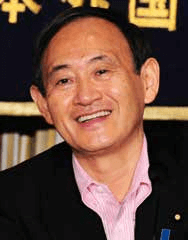Issue:
Chief Cabinet Secretary Suga defended the administration’s policies in a long awaited visit to the Club

photo by HAJIME OKINA
Who among the FCCJ’s journalist members have not lost count of the number of times they have mentioned Yoshihide Suga in the 18 months since Shinzo Abe became prime minister?
Whether described as Japan’s top government spokesman or, more formally, as chief cabinet secretary, Suga is the public face of the Abe administration: a conduit for his boss’s conservative project, and his first line of defense against public and media criticism.
In early July, and after much persuasion, Suga agreed to pit himself against FCCJ journalists. For a seasoned politician with a reputation for unflappability, however, it was surprising that his office requested that at least some of the questions be submitted in advance to allow him to “prepare properly.” Surely Suga and his handlers knew what was coming. In the end, over the course of an hour on July 11, he was asked about collective self defense, North Korean sanctions and the parlous state of Japan’s relations with China.
He began his FCCJ appearance by outlining the government’s priorities: breathing life into the economy, speeding up recovery in the region hit by the March 2011 triple disaster, and addressing the “severe” security environment in the Asia Pacific.
He had praise, too, for the current Cabinet’s longevity 500 days with no change in personnel in stark contrast to the ministerial chaos that marred Abe’s ill fated year in power from 2006. And he said the three “arrows” of Abenomics had “drastically improved” the health of the economy, with six consecutive quarters of growth and a ratio of job openings to job seekers at its highest rate for more than two decades. “Unless we have a robust economy we can’t provide the population with social security benefits,” he said. “And we can’t pursue our diplomatic aims or provide the reconstruction funds we need.”
He dismissed criticism of the third and, as of now, the least aerodynamic of Abenomics’ three arrows: a program of structural reforms that includes raising the status of women in the job market and entering the Trans Pacific Partnership free trade agreement. The administration, he said, had been courageous enough to take on vested interests that had for decades resisted longverdue reform of the agricultural and energy sectors.
But he was less ebullient when confronted over the most contentious decision of Abe’s time in office: lifting the ban on collective self defense. Why, he was asked, had Abe not shown the strength of his convictions and pursued outright revision of Article 9 of the Constitution? “Our priority is to ensure the peace and safety of the Japanese people,” he replied. “When Abe returned to power he was concerned with the government’s ability to protect the country’s people, and asked experts if the current legal framework was capable of meeting that challenge.”
While critics accused Abe of abusing the coalition’s majority to push constitutional revision through the backdoor, Suga played down claims that Abe now has carte blanche to send Japanese troops to fight alongside allies overseas.
Instead, the shift on security was a necessary adjustment that reflected the changing nature of the dangers facing Japan’s citizens, 1.5 million of whom live overseas, with a further 18 million venturing abroad on holiday every year. “That’s the kind of globalized world we are living in. The security environment is much more severe, so we thought it appropriate for the government to show its fundamental thinking on security,” Suga said.
He was challenged on a 2009 Liberal Democratic Party proposal stating that sovereignty lies with the people in any decision related to the Constitution. “The Cabinet took into account the severe security environment and the responsibility of the government to secure the safety of the nation and its people, and to do that we have the right to use minimal self defense,” he said. “That’s no different from previous government’s interpretations [of the Constitution], which is why we saw no need for constitutional reform.”
Asked why the government had ignored opinion polls showing that a majority oppose collective self defense, he said: “Abe feels strongly about honoring his commitments, and from the outset one of those was establishing a more thorough system of crisis management. The government has a clear responsibility to guarantee the safety of its people, regardless of ups and downs in the opinion polls.”
Days before Suga’s FCCJ appearance, Japan relaxed some unilateral sanctions against North Korea after concluding that Pyongyang was serious about determining the fates of at least a dozen Japanese citizens abducted by the North in the 1970s and 80s. Suga was asked if Abe was considering a repeat of Junichiro Koizumi’s 2002 mercy mission to Pyongyang, which resulted in the return of five abductees and their families.
“The door has opened just a bit,” he said of the fledgling rapprochement with Pyongyang. “We judged that the [North Korea abduction investigation] committee was serious, with the power to investigate government bodies, which is why we relaxed some sanctions. We are committed to bringing all of the abductees home.
As speculation mounts that Abe will hold a rare meeting with his Chinese counterpart, Xi Jinping, on the sidelines of the APEC summit in Beijing in November, Suga simply repeated the official position on sovereignty of the Senkaku Islands that historically and based on international law, the territory is Japanese. “Having said that, we are the second and third biggest economies in the world, so we have a responsibility to ensure the peace and prosperity of the Asia Pacific. Because of that, the door to dialogue to us is always open.”
Justin McCurry is Japan and Korea correspondent for the Guardian and the Observer. He contributes to the Christian Science Monitor and the Lancet medical journal, and reports on Japan and Korea for France 24 TV.

